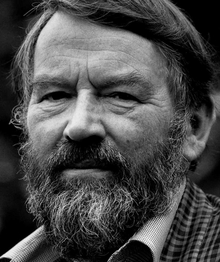Baseball and cricket are beautiful and highly stylized medieval war substitutes, chess made flesh, a mixture of proud chivalry and base - in both senses - greed.

"John Robert Fowles" was an English novelist of international stature, critically positioned between modernism and postmodernism. His work reflects the influence of Jean-Paul Sartre and Albert Camus, among others.
After leaving Oxford University, Fowles taught English at a school on the Greek island of Spetses, a sojourn that inspired The Magus (novel)/The Magus, an instant best-seller that was directly in tune with 1960s "hippie" anarchism and experimental philosophy. This was followed by The French Lieutenant's Woman (1969), a Victorian-era romance with a postmodern twist that was set in Lyme Regis, Dorset, where Fowles lived for much of his life. Later fictional works include The Ebony Tower, Daniel Martin (novel)/Daniel Martin, Mantissa (novel)/Mantissa, and A Maggot.
Fowles' books have been translated into many languages, and several adapted as films. He was named by the Times newspaper of UK as one of the 50 greatest British writers since 1945.
If you enjoy these quotes, be sure to check out other famous novelists! More John Fowles on Wikipedia.In some mysterious way woods have never seemed to me to be static things. In physical terms, I move through them; yet in metaphysical ones, they seem to move through me.
An answer is always a form of death.
That is the great distinction between the sexes. Men see objects, women see the relationships between objects.
Whatever sympathy I feel towards religions, whatever admiration for some of their adherents, whatever historical or biological necessity I see in them, whatever metaphorical truth, I cannot accept them as credible explanations of reality; and they are incredible to me in proportion to the degree that they require my belief in positive human attributes and intervenient powers in their divinities.
Most marriages recognize this paradox: Passion destroys passion; we want what puts an end to wanting what we want.
We all write poems; it is simply that the poets are the ones who write in words.
So I felt this burning summer. In form I mightbelong to humankind; in reality I seemed one of aravenous self-destroying horde of rats.I am glad there is no God. If there were,I cannot imagine that we rampant, myopic, andinsatiably self-centred creatures shouldbe allowed to survive a single day more.
There are many reasons why novelists write, but they all have one thing in common - a need to create an alternative world.
Copyright © 2024 Electric Goat Media. All Rights Reserved.